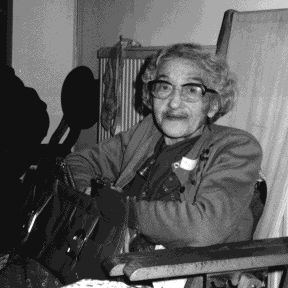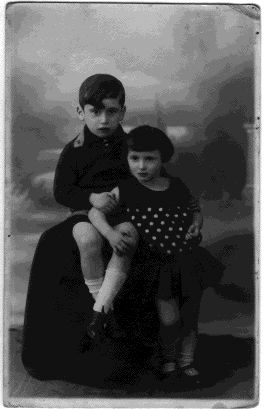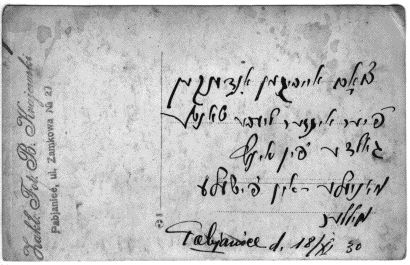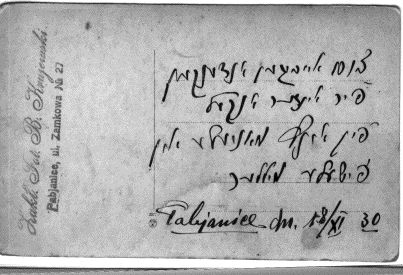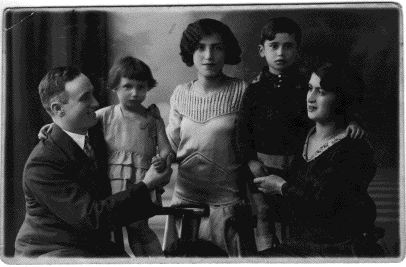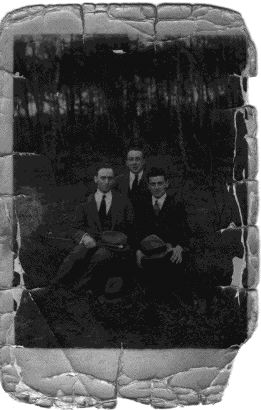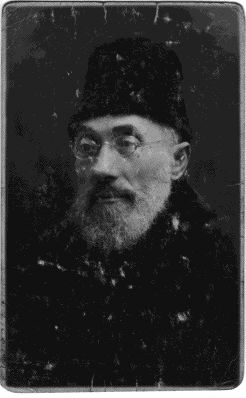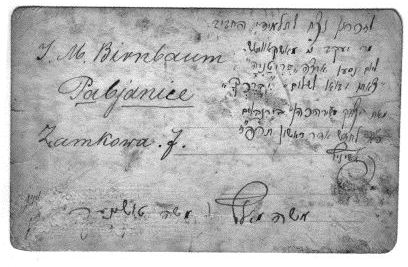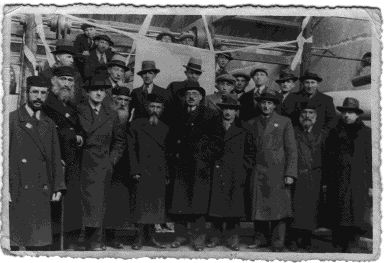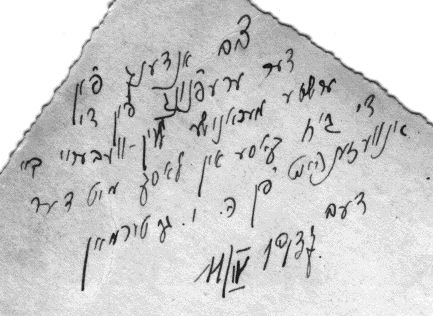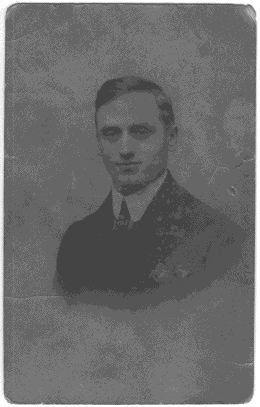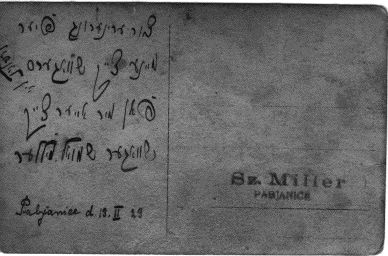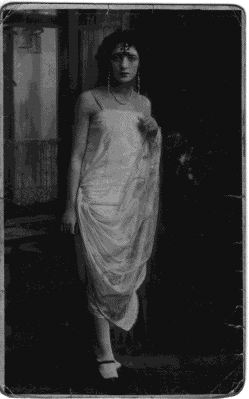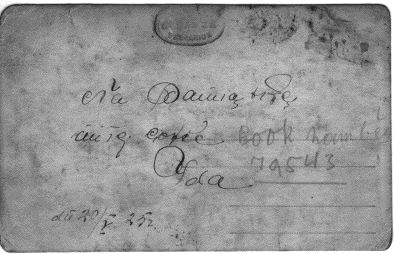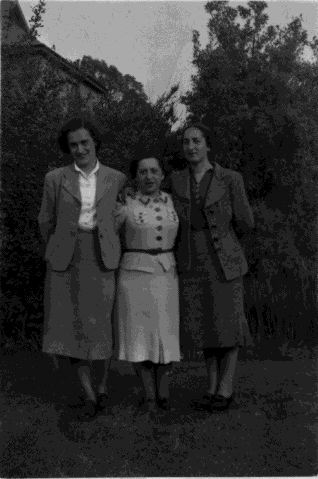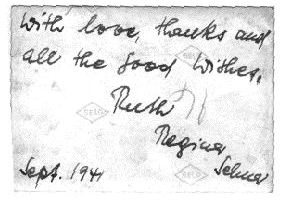|
| ||||
|
|
||||
|
Golda
Weinberg
Golda's fabric shop next to the Odeon cinema in Sidwell Street was a Jewish landmark in Exeter, especially during the Second World War, when American Jewish servicemen called in. She would never discuss the great sadness in her life. Her husband died very young, leaving her with their only child, her beloved son Isaac. He went to Bramdean, a private school in Exeter, then Taunton School, also privately, and won a scholarship to Oxford. His degree diploma hung on her wall. He went to America, where he had a post, I believe, at Princetown, married, and had a son and daughter. When they were very young he died suddenly. The shock almost destroyed her, and it took her several years to recover. She was a regular attender at shul for the last years of her life, very much a boobah to all the children, with sweets in her pocket, and Easter eggs at Pesach! She spoke as she looked at her photographs.
These are my sister's children. A boy and a girl, the boy is older. They are not alive. They were all killed in the Holocaust. The boy was 14 when he was killed, and the little girl was 12. That's Fiscal, she used to call him Falec, and the little girl Mania. That's in Polish, Mania. They were in Poland. I'll tell you. I'll show you my sister. Now before the war I went to visit my sister, so we've got a photograph. This is me, see. This is my brother-in-law and this is my sister. They were a very very happy family and they had a boy and a girl, just what they wanted, she didn't have any more. My brother-in-law was a very nice young man. This is my brother-in-law you see, these are his friends. Now, he didn't have his own business, but he was a manager in a factory in a textile business. In the town of Pabjanice near Lodz. Not far from Lodz there was a tram car used to go from Pabjanice to Lodz. I was born in Pabjanice, yes. And he was a manager of this textile business. I'll tell you the story about him now, but he had his own looms there, he installed three looms. He was allowed to do that by the owners, a Jewish firm. The textile businesses were mostly Jewish people and he had his own loom and he used to work there at the factory but he also had people in the villages - Polish people, not Jewish people, who used to take the work home, they used to have looms and do the goods (work) and bring it back. He had very good friends of the Polish people, non-Jewish people. And they were very fond of him and when I was there, this time, (referring to photograph) they gave him some birds and he used to take a very great interest in hatching the birds, looking after birds. He liked birds. So, when the war came, they were away on holiday near the German border. When the war broke out they quickly rushed home instead of rushing this way, west, but they never thought, they never believed the Germans would do anything like that. I mean they can be fascist, but not persecute the Jews. Like Mussolini didn't want to persecute them until Hitler forced him; or the others, Horthy, Rumania, Hungary. They were very much on the Right, but they would not persecute the Jews, neither did Franco in Spain, did he? You see until he was made, my brother-in-law, this one here ...because he was a well known man in the city. So, the Nazis, the German occupation made them work in their office and in the evening he was allowed to go home to his wife and family. So, naturally, to give information about other Jews and all that, but they couldn't stomach everything, and he didn't work true for them. I suppose he tried to save what he could. This is the information I got after the war. So, they shot him. They just shot him! So, my sister, and also the boy, this little boy got very tall. He was 14, but he looked like 17 and these young men,they did away with them straight away. So, they took the boy away. You see, I think, I'm not quite sure, but I think that they sent them to Treblinka. We never heard of them again. Well, when my sister lost her husband, they took her out of the home. She had a nice home, and my parents they had a property in Poland an Pabjanice and they lived in that house. But it was a big house, a big school, a state school; so there was a big income and they used to send the income over here to my parents, because my mother and father got ill and they wanted to go back to Poland, to live on the income. My parents were in England, that's a different story. and they wanted to go back to Poland and be able to live on the income. Meanwhile my sister and brother-in-law, they had a beautiful home in that house, a flat. It was all flats, so they sent my sister and the little girl to Lodz, to the ghetto. There was a ghetto in Lodz - you know that? And there she became confused in her mind as you can imagine. But the girl, she was 12 by then, this little girl, this one. She used to go and try to get a bit of food and all that and she looked after her mother in the ghetto...Now I've got here - oh, this is the girl. That's when she was older. This is cousins. Now, this cousin, her mother and my mother were sisters and my Auntie lived in Lodz, in the ghetto and she had 10 children, but three survived out of the ten, and this one, Lola, she survived and I managed to get in touch with her while she was still, when Auschwitz was liberated. I managed to get in touch with her. She survived. She's a survivor of Auschwitz, and I used to send her foodstuffs from here. Sugar, flour, whatever was allowed. And she was ill in the hospital. It was after the war. When they were liberated. Before then you couldn't send anything. So she, when she was better (she was in hospital) when she walked about, they asked her would she go up to the men's ward and look after the men, help look after the men. So she went there, and she met this man, and she looked after him. He had, he had lost his wife and 2 sons in Auschwitz. So, after the war, when they got better they go married in the hospital. But they went back to Lodz to see perhaps, if somebody survived. They didn't know. But they found that she survived, Adja, one of the ten children and a brother survived also Fischal, the same name as my nephew. They were both named after the grandfather. And, and, and the ghetto - a lot of people died - and they all shot and this...and they put a tombstone for her father...and he died in the ghetto see? (looking at photo) So, consequently they went to Israel and I went to Israel. I saw her. Because I was in contact with her all the time. And she tried to tell me in Israel what happened, but I didn't want to listen, because I had a cousin, a second cousin from the same family. And she survived Belsen and she was 1 in 7 to survive. She was here with me for six months in Exeter and in the whole of the six months we talked and she told me from A til (to) Z. And after that, I didn't want to hear no more. I knew it all. And I've always got it in my heart and I always lived with it. So, that's this family. So, there's only there two survivors this and this (photo) because her youngest brother died, but you know she, Lola, it's wonderful how she survived, because they had all the women and the children in the ghetto in Lodz had to stand while the Gestapo chose who they liked, they snatched out - the selection, and they snatched out a child, a baby of 2 years old 2 or 3 and she was standing like this, and they snatched him out of her arm, never saw him again and dumped it on the lorry. That's that. This is Lola, this is Aja. And he, he lost. And then, when they went to Israel, they had a daughter, their own daughter. A lovely girl. Yes, she married an Israeli. This is the boy when he was older. All this family was killed. All this. Lola wrote to me. She saw it. She was there. When it happened in the Lodz ghetto, because she said when the little girl used to come, Lola was working there and she used to distribute the food. There was rotten potatoes and cabbages. So when she saw my niece, when she saw this little girl, this one, she gave it to her straight away. She didn't have to wait. She made her a little bit of an exception. So Lola told me all this. 1937 you see, that photo. It's written in Polish. Now, that's that family. And nobody survived because they, my sister and the little girl were subject to selection. And it was only just before the war ended, because six months...they would not have taken her. She would have been alive. Now, this is a very fine gentleman. He was a Hebrew teacher at the school. His name was Birnbaum. I keep it you see. In Pabjanice, see (looking at the photo) the writing on the back. This is Yiddish, Yiddish. And this is Hebrew. Jacob Moscovitz. Moscovitz is my maiden name. My maiden surname. Now, this is this family. The same children, but nobody survived. Then I had a brother as well, and he had no children and his wife. My eldest brother. I don't know what happened to him. He was in Pabjanice. And I went and made enquiries and I was told that a gentleman had survived and they think that he had the same cap. They wrote me his address and I knew this family. I didn't know the people. Because my father used to correspond, my parents corresponded with these people you see. We were well known in Pabjanice, because my father was a very big business man at one time and, also, they used to give a lot of work to people. To the Polish people in those days in textile business. Well I wrote to this man, and I introduced myself, who I am, and he wrote to me to say that if I hadn't heard up till now. It was a couple, a few months later until I got all this together. If I hadn't heard up until this time, I shouldn't bother to write, to make any further enquiries. He did see him in the concentration camp. He did see him. He saw. But he didn't say anything else, but he said, "Don't make any further enquiries." Otherwise I would have heard. I went to the Red Cross as well, but they couldn't..... I was glad to get personal anyway. They had their methods. I don't know how they worked; but they couldn't do anything. But I had it personal. I had the other family from Hilda, when she was here six months with me. How it was organised and all that, this you know don't you? But you want to know personal about the family didn't you? And you can have the name if you want to know the name. I can give you the names. This is a little town near Pabjanice. There is Lodz, Pabjanice, Lusk. Lusk is a small town, but it was rather important because they had a big council there.
And all these people belonged to the same club. All these people. And this one is my uncle, my mother's brother. Now listen, I'll tell you something. This man was an awfully nice man. Not because he was my uncle, but he was a very nice man, very kind, very kind. I think you can see it in his face. He wasn't orthodox. Not everybody with beard is orthodox you know. But he was quite "from" - Religious. He wouldn't eat breakfast without praying. He kept the sabbath and all that. His wife didn't have any children so they were very grieved. They had a little shop, a drapers. So they adopted a little girl, a little daughter, well after a little while she had a daughter of her own. So this daughter, she was called Simchas Torah. Do you know that name? 'Simcha' is Hebrew means 'joy' and torah is the holy scroll. 'Joy of the Torah'. Such wonderful words. Then she had a son and they called him after an ancestor, Jack, the uncle. But Jack was not very healthy . He was lame. He walked like that. But they all loved him. The girl that they adopted, and the sister, they loved him very much. My uncle said the daughter had married, the adopted daughter got married and he wanted to retire and wait until Jack got married and he will give him the little shop and his wife can help. But Jack was very clever. He was reading a lot, you know he was full of arguments, always discussing things - he takes after me! (to the family) and then they got all those men to march, march into a place to be kept together, I don't know where it was, a synagogue, a church, someplace... As he marched next to his father, he was lame, so the Gestapo saw that, they shot the boy in front of his father! In front of him! Such a beloved child! I didn't think he wanted to live any more this man. They demoralised them. The people were so demoralised they wanted to die. They taking away the home, they taking away the living, everything. The children...you see. This I was told. A cousin of mine in London, she survived, her husband was in this country, but the wife survived. But she told me this. This was all information from the horse's mouth.so, his name was Yap, was Ancho com - you can see it in Yiddish (looking at the photo). They knew - that's that. And this I knew from a cousin of mine in London who survived.
Now this is my brother-in-law again, the one who married my sister. There were six of us, but they were the eldest and didn't come to England. They didn't want to come. They were married. My sister was engaged, settled. You see, my mother and father wanted to go back but they got ill. They died six months from (before) the war. They were going back in the spring, and in the spring they both died. My father died in Easter, and my mother died...very loving family. They didn't want to live. I came to England, I was very young, but I used to go to Poland and visit my sister and brother.
Now, this is a cousin of mine. My uncle lived in France, I don't know he had some business, he was a big businessman. And he got a business in France. And he had two daughters and two sons. When Paris was occupied, he didn't think they would touch the old people. So he went to the back and he came home and told his wife that - he took it so much to heart - he said,"I don't think I can stand this much longer." And he told his children that, the sons and daughters - to save themselves, and they were so frightened naturally, that they saved themselves and they hid themselves. And this one as well, that's the daughter. They went into hiding, so my uncle was taking it so much to heart, all this, that he used to go shopping. My auntie was afraid. He go ill. And he wanted to die. You see, people ask why the Jewish people didn't fight. In the end they didn't have anything to live for you know. They wanted to die. I've got a photograph here to show you about it. And he called up the concierge. And he said to the concierge, "I'm going to tell you a very serious thing. Take all the money I've got in the house. Take everything, everything you like. But I want you to give me your hand," - he was in bed dying you know - "And swear that you will protect my wife," ...and he put his hand....sorry....and he promised him that. He promised to protect his wife. And this man this concierge was in the resistance. So he died.About the funeral I don't know, I never enquired, because I had had enough. And he took care of her, he took her out for walks at night, my auntie. She couldn't speak a word of French, because she was Polish, only Yiddish and Polish she spoke. But she was a very smart woman, wonderful woman - you can imagine he loved her so much and he was a big businessman. So, he took her out at night for walks, to get the air. But he kept the curtains drawn because the Gestapo used to ask, "Who lives here? Who lives there?" but this, some excuse he gave. I don't remember what excuse he gave. But he kept her like that for two years - two years! But he used to report to the Resistance, she was on the list, he told them what happened. What he had promised and all that, and he said he doesn't think he can keep the gestapo away much longer, because they had been asking too many questions. You see so they had a meeting there and the resistance decided that she had got to be, must get her away. So, have to get her away? How? So they made a plan. That she will act that she is dumb, deaf and dumb, can't speak - and that's his mother. You see? So they had to teach her how to be deaf and dumb - it's not so easy! She wasn't deaf and dumb at all, she had everything. And the family... She understood German as well, because if you understand Yiddish you can understand German. So, they took her away in a plane and this poor resistance man, he was trembling at the time, but they managed to get her away. Where they got her away, when I don't know. Because you see, I had so much, I didn't want to ask any more questions. To survive was good enough. And Yida, so, she survived. She died not long ago. In France. They got to do a different big (?) They had, the resistance had their means. Then Yida, Ida - they made her false papers, documents that she wasn't Jewish. And she had a little girl. She's very smart. She was very educated. She went to University and she spoke French, she spoke several languages. So, with the papers she was terrified of the Nazis terrified. So wherever she ran away with the little girl, they got there somehow. They said that little village is quiet, there are no Germans there, she went there. Then, whether she imagined it....she said, "They chased me all the years." And in the end she couldn't stand it any longer; that she might get the child into the Catholic church, the Catholics seemed to protect the Jewish children after the Pope gave out the order. Because there was a British M.P. called Edelmann, Maurice Edelmann. Did you hear of him? He was a very famous man because he used to write novels. You can get his books. And he went to see the Pope during the war. Edelmann was one of the M.P.'s that were very honourable. There was another one, Moonman, he writes now in the Jewish Chronicle. He's a very honourable M.P., not all the M.P.s am I keen on, but I know that Edelmann was honourable and he went to see the Pope, and he said to the Pope during the war,....he had the means to go you know he was an M.P.,and he (the Pope) made an agreement with Hitler. He said, "Did I want to make an agreement with Hitler?" because I heard Edelmann speak on the radio after the war and the Pope said,"I didn't want to make an agreement. They used to be so much down on the Catholics, that I saved the Catholics. But I gave the churches orders, secret orders, that - save as many Jews as you can." And he took them into the Vatican as well. You see all religions are the same to me. If you believe in a God, that's that. I mean Christianity is a wonderful religion isn't it? Christians, they've got a different way of praying. And then the Pope cried bitter tears - Edelmann said that, and he said, I've done, I do what I can, all the churches have got my orders to save." And she gave the little girl into the church, and she ran about, you know. She had the different papers, she survived that. And she married a Resistance man, because they arrested her as a spy, not a Jew, but as a spy, for one reason and another. You know - and her face, to be a spy! It's ridiculous! But the Germans did, and they questioned her and the Resistance couldn't do anything. They used to come and visit, the Resistance, in prison, and they told her what to do, what to say. In the end something they said that she should admit and they wouldn't let her go. They told her what to do, they told her because the used to come and visit the prison; and they had the means you know, the Resistance. Then they said she should admit that she was a spy, and then they would be able to save her. Then she did, and she survived. And she married that man from the Resistance, so she married him and she had another child. So, there's that one that she handed into the Catholic church, she came to see me. She was a teacher, and she had some job in Devon. A beautiful girl. But she died... You see her mind was all spoilt. The mother, she was young,soon after the war. She would be in her 40's, early 40's. she came to London. I saw her. Then she told me that they chased her all over France, and she imagined all sorts of things, and the younger sister she also survived but they died. They went through too much. You couldn't go anywhere. You couldn't escape. The whole of Europe was occupied, except for England and you couldn't get over here. So, that's that.
Now, I've got here a photograph of three girls. These were refugee girls in England. They came over as domestics. They weren't domestics but they cam over as domestics. You see that's 1946. You see - Ruth, Regina, Selma, from Germany, and they stayed with very nice ladies in Otterton. Not all of them, they all stayed in different places. She was a very beautiful girl, Ruth, and this is Selma and this is Regina. Now, she done (did) very well. She got in touch with some old friends. The gentleman was a doctor and he escaped from Berlin, and they were friends with her family, Regina and she was after, after...... to Israel, and she......her husband. He had five children, this doctor and they've all done well in Israel. They all got educated and very high jobs, and her husband. She phoned me up not so long ago, she came to England, and her husband is in the International Stock Exchange, so when I was in Israel I went to see her of course, and she had a very beautiful home, really lovely, and she lived in the same flats that Mandy Davies - you remember? And she said Mandy Davies called me down Christmas morning - and she is very well, she has done very well. And when I was there her husband took me out to a nightclub you know to Jaffa. But Ruth, she went to America. She didn't do so well. She made a bad marriage. Then she didn't get married, she didn't get married for a long time...and that's how time flies. But she had a lover in Exmouth, a clergyman of all things! But why she didn't marry him......? Regina said, "I can't imagine Regina being a clergyman's wife. All their families were killed. They were the only survivors. Well, her brothers, that were in America survived, but all the families were killed, of these girls. But that's the story, they were all killed. But, she lost a son in Israel - two boys. Oh, yes I must tell you this - So, when she put a memorial for her family and she told the boys what happened, and they went to this memorial, this synagogue, and the boys were Israeli born and they said, "Why didn't they fight? Why did they go like sheep?" And as somebody told me who went to look for her relations, a girl here, also a refugee, you'll see her; she told me that the Jewish people wanted to die, they didn't want to fight because they had nothing to live for. They took away...you see? Would you want to live? I mean to say, in those circumstances? Oh there were lots...but the Italian novelist Levi - you heard of him? He committed suicide in the end. So did Koestler, didn't he? I believe he actually committed suicide. He threw himself out of the window, didn't he? He was a very famous novelist. But I think that committing suicide is a great sin. Yes. I believe that. That's not to say what other people should do, also, what I do believe in, my father was a very clever man and he was very, very religious, this knowledge came from the Bible and I like to - you see, I've got the Pope there (pointing to a picture) because he says some very clever words, and from these, from theology you can learn. Any church, if there is theology, you can learn from the Bible, can't you? You know they say, and my father had some very good sayings, he said, "Knowledge comes from the head, wisdom comes from the heart." I said, "Why is it such a terrible thing to commit suicide and he said, - I used to discuss with my father - he said, "Its a mark on the family for a hundred years or more." I mean I went through myself...here in England, I won't tell you that... but I've got grandchildren. I've got a niece and a nephew in London you see. Also the Pope said, "You ask why the innocent people suffer?" Well, I can't say I'm innocent, I haven't got any sins, because at my age I must have some sins. But he said, "Children suffer - our children." - Well, your little boy? they haven't got any sins you see. There are so many children who suffer. He said, "We have no answer to that, therefore, we must accept." You see, a very clever answer. You must accept. You see, I had a very sad life. I don't want to talk about it, if you don't mind. [That's your son?] And I got a hole in my heart, but I must accept it, I can walk about, I can help other people. I help at the shop. It's a little business you see? She trades under my name and I help her. She just lost her husband, a terrible tragedy, and I took over the business for a little time. She couldn't have handled it. So, The good God, the good Lord has looked after me. And I can keep this little place. So I've got to thank God haven't I? I've got to accept that, as the Pope said, that's what I tell you. So, that's that. Are you satisfied? You can lend those if you like (the photos). This I'll keep because since then my granddaughter had a scholarship to France. I told you didn't I? And here, you see she graduated, and do you know what she won it on - The Holocaust. But I didn't influence her, not directly, but just by being... Well, she grumbled to my neighbour next door that I never tell about the past, and I never told her a thing. I never want to talk about it. But she wrote it. And one day she lost her key (while staying) and she couldn't get in. So, she stood outside, so my neighbour said, "What are you standing here for Lori?" She said, "I haven't got a key." So she called her up and tried to telephone. so they telephoned me. I wasn't far but the car wouldn't go that evening and they brought me home. Then my neighbour came down. She was writing an essay. I didn't know she was writing about the Holocaust. She said, "Have you suffered persecution?" and I said, "Personally, no. I've been living in Exeter 50 years - over 50 years - and I never encountered any prejudice. I dealt with education, I dealt with banks, I dealt with all sorts of people. I've done voluntary work, worked in a hospital here for the incurables Newcourt and I never...a chip on my shoulder I haven't got. I never met any prejudice." And she said, "Has your family?" And I said, "Oh yes!" And she took all the particulars, she wanted to know their names and addresses, where they lived and everything, and she told me that when she wrote the essay, she wrote it differently because she knew that she was involved directly. I said knowledge from the head and wisdom from the heart. And she wrote this essay - she got an award to go to France for a year. Other people wrote it as well. They were all surprised. "Why you Lori? We all wrote it." A lot of people wrote it. This professor is very strict. He doesn't throw his 'A's about. The Pope - If he didn't make the agreement then there was nothing he would have done. What he saved he saved - didn't he? They saved Lady Rothschild in France didn't they? They smuggled her out during the night. They saved a lot of people the Catholic church. A lot of children. You know that the Pope, when he was in Poland after the war, he helped a lot of the Jewish people you know. And they brought a child to be baptised and he said, "You're a bit old to have a baby?" and they said, "No, it is a Jewish child that we picked up." He wouldn't baptise it. He said, "Oh, no, this child's got to be claimed. The parents will claim it. The Jewish authorities will claim it. He's a Jew and he's got to be given to the Jewish people. You see? I mean, Quakers are nice. Because I was invited to the , but I didn't go. I didn't want to mix with people like that, with such high class people... (Talking of her nephew and niece in America) He is at a Californian University, she is in New York. so they don't see each other. (Re Frank) He's ever so nice. He works too hard. He gives me very great respect. I'm very fond of him. And Brana? You know Brana? I'm very fond of them. You know, in this world the best thing is to forgive. You know, I've read an article in the Sunday Telegraph this week ... Jesus was poor, and when you look at communism they strive for the same thing - but it isn't practical. It isn't human nature, communism, when it's practiced it's wicked. It's wicked... and so is Christianity, the true Christianity and the Torah as well. It is more communist that Karl Marx. But at least they've got certain laws... I don't say revenge in your heart but justice... It's not practical the communism neither is the religion. Like yourself, she was mad on the Jewish people. A wonderful person she was. She was, a wonderful woman. (Re. helping Catholics... speaking to the R.C. Priest) He asked why I helped Catholics. I said, "Well, Father. I was born in Poland. It's a loyalty to my people isn't it? Living in Exeter, I like the people. I wouldn't live anywhere else now. My nephew says why don't I come up to London. I say "No!" Next | Back Home | About the Restoration | Holocaust Testimonies | Visit | History | Tour
|



